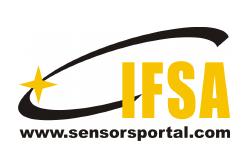
Comments: download PDF.
Ref.: Sensors & Transducers, vol.189(6), pp.89-96, June 2015.
Abstract:
Underwater communications mainly rely on acoustic propagation which is strongly affected by
frequency-dependent attenuation, shallow water multipath propagation and significant Doppler
spread/shift induced by source-receiver-surface motion. Time-reversal based techniques offer
a low complexity solution to decrease interferences caused by multipath, but a complete
equalization cannot be reached (it saturates when maximize signal to noise ratio) and these
techniques in conventional form are quite sensible to channel variations along the transmission.
Acoustic propagation modelling in high frequency regime can yield physical-based information that
is potentially useful to channel compensation methods as the passive time-reversal (pTR), which
is often employed in Digital Acoustic Underwater Communications (DAUC) systems because of its
low computational cost. Aiming to overcome the difficulties of pTR to solve time-variations in
underwater channels, it is intended to insert physical knowledge from acoustic propagation
modelling in the pTR filtering. Investigation is being done by the authors about the influence
of channel physical parameters on propagation of coherent acoustic signals transmitted through
shallow water waveguides and received in a vertical line array of sensors. Time-variant approach
is used, as required to model high frequency acoustic propagation on realistic scenarios, and
applied to a DAUC simulator containing an adaptive passive time-reversal receiver (ApTR). The
understanding about the effects of changes in physical features of the channel over the propagation
can lead to design ApTR filters which could help to improve the communications system performance.
This work presents a short extension and review of the paper [12], which tested Doppler distortion
induced by source-surface motion and ApTR compensation for a DAUC system on a simulated time-variant
channel, in the scope of model-based equalization. Environmental focusing approach in high frequency
underwater acoustics is intended to be explored in future, based on the idea that a set of oceanic
acoustic physical parameters -- which are generally estimated in well-known low frequency matched
field processing problems like geoacoustic assessment, ocean tomography and source localization -
could be conveniently used on adaptive filters for channel compensation in DAUC systems.